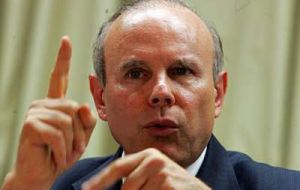MercoPress. South Atlantic News Agency
Brazil announces measures to stimulate economy and domestic consumption
 “We need to prevent contagion of the external crisis”, said Minister Mantega
“We need to prevent contagion of the external crisis”, said Minister Mantega Brazil's Finance Minister Guido Mantega announced Thursday a package of measures aimed at stimulating the economy and domestic consumption, amid an international crisis mainly affecting developed nations as a consequence of the Euro situation.
The 2.8 billion Reais (1.5bn dollars) package of government measures targets 5% growth next year includes a reduction in levies on consumer loans, home appliances, homebuilding and foreign purchases of corporate bonds tied to infrastructure projects plus suspension of a levy on foreign stock purchases.
The stimulus measures come a day after the central bank cut the benchmark interest rate for a third consecutive meeting amid signs the world’s sixth-largest economy is stalling. GDP expanded 0.3% in the three months through September, the slowest pace in 10 quarters, the Finance Ministry estimates.
“We need to prevent contagion of the external crisis,” Finance Minister Guido Mantega told reporters in Brasilia. “Brazil’s domestic market is our strength”.
Emerging markets that have been fueling global growth since 2008 are taking action to ensure that Europe’s deepening crisis and a slowdown in the U.S. do not ensnare their own economies. Brazil’s moves followed Mexico’s decision this week to tap its 140 billion foreign currency reserves to stanch a slide in the peso and China’s lowering of reserve ratios, which will free up more lending resources for banks.
Thursday’s measures reverse steps taken last year to limit the Real appreciation by restricting capital inflows. The Real strengthened 46% from the start of 2009 to August this year, as near-zero interest rates in the U.S., Europe and Japan led investors to seek higher returns in emerging markets.
Still, with markets remaining volatile, Mantega said that Brazil will hesitate to redeploy the measures to prevent the Real from strengthening again.
“We are keeping our arsenal in place and, at any time, if there is a risk of speculation returning, we’ll adopt measures” Mantega said.
Beginning today, the so-called IOF tax on consumer credit will fall to 2.5% from 3%, Mantega said.
The government is also extending tax cuts on basic staples like flour, wheat and bread, and reducing a tax on pasta. Taxes on white goods including stoves, refrigerators and energy- efficient home appliances will fall to as low as zero from as high as 20% currently, Mantega said.
The Finance Ministry estimated the total cost of the measures in an e-mailed statement, updating initial figures given by Guido Mantega.
Central bank president Alexandre Tombini has repeatedly said that Brazil should strive to maintain its solid fiscal position even if the global economic climate worsens. The bank’s forecast that the inflation rate will fall to its target next year assumes that the government will meet its 2012 budget goal of delivering a fiscal surplus before interest payments of about 3.1% of GDP.
In 2012, Brazil will maintain the same fiscal “austerity” implemented this year to give the central bank room to reduce borrowing costs, Mantega said.
The Central bank cut on Wednesday its benchmark Selic rates half a point for the third straight meeting to 11%. Traders are wagering that the bank will cut the Selic to as low as 9.25% by July.




Top Comments
Disclaimer & comment rules-

-

-

Read all commentsBrazil is cutting tax on various items.To stimulate demand?why don't they leave the tax on and spend it on welfare.who are they responding to,their citizens or some other needy body?is it the need of capitalism?Will the tax reduction suck in imports or lead to the outflow of capital in the near future?
Dec 02nd, 2011 - 12:46 pm 0'Brazil is cutting tax on various items.
Dec 02nd, 2011 - 06:45 pm 0- To stimulate demand?
- Why don't they leave the tax on and spend it on welfare?
- Who are they responding to,their citizens or some other needy body?
- Is it the need of capitalism?
- Will the tax reduction suck in imports or lead to the outflow of capital in the near future?'
Such a lot of questions, Yul. Unfortunately, I do not know the answers.
With any luck, Forgetit will contribute. He is usually good on financial topics.
Obviously they wish to.stimulate internal demand to grow the economy.I imagine as Dilma and CFK meet in Caracas they will equally discourage non mercosur imports but do all they can to sustain and improve the performances of PYMES within the economies which are vital in creating employment.
Dec 03rd, 2011 - 12:48 am 0Commenting for this story is now closed.
If you have a Facebook account, become a fan and comment on our Facebook Page!